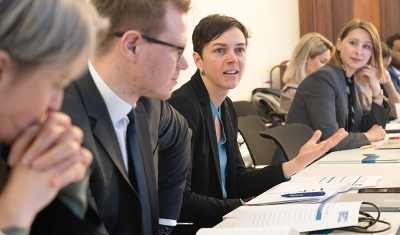Reflections on the open-ended intergovernmental working group outcomes and the potential for developing a Commentary
Event


Adobe
This side-event, co-organised with the University of Copenhagen Faculty of Law and TRIAL International, will examine the Revised Fourth Draft Instrument on Private Military and Security Companies (PMSCs), assessing its strengths, gaps, and alignment with international frameworks. It will also explore challenges in ensuring accountability, potential improvements, and the feasibility of developing a commentary to guide its interpretation and implementation.
Outline
The Human Rights Council established an open-ended intergovernmental working group, to elaborate the content of an international regulatory framework, without prejudging the nature thereof to protect human rights and ensure accountability for violations and abuses relating to the activities of private military and security companies (PMSCs). Over the years, the working group has released several draft instruments, with the most recent being the Revised Fourth Draft Instrument, published in March 2025. As discussions continue on the legal and practical implications of the draft instrument, there is an emerging need to reflect on its strengths, gaps, and areas requiring further refinement.
This event aims to:
- Assess the current draft of the PMSCs instrument, identifying its strengths and potential areas for improvement.
- Analyze the relationship between the PMSCs draft instrument and other existing regulations, including international frameworks on mercenaries, transnational corporations, and human rights accountability.
- Identify challenges and opportunities in ensuring accountability for human rights violations involving PMSCs.
- Explore the feasibility of developing a commentary to the Draft Instrument on PMSCs and its potential impact on implementation and interpretation, and define its scope and content.
Speakers
- Prof. Anita Ramasastry, Henry M. Jackson Professor of Law and Director of the Sustainable International Development Graduate Program, University of Washington School of Law
- Dr. Sorcha MacLeod, PI MERCURY Project & Associate Professor, Faculty of Law, University of Copenhagen
- Chiara Gabriele, Head of Program - Accountability for PMSAs, TRIAL International
Moderator
- Florence Foster, Senior Project Manager, Geneva Academy of International Humanitarian Law and Human Rights










